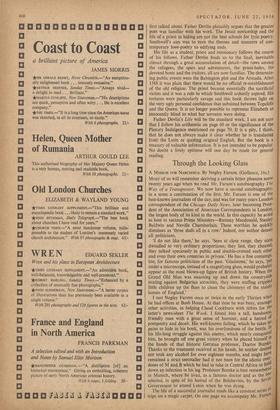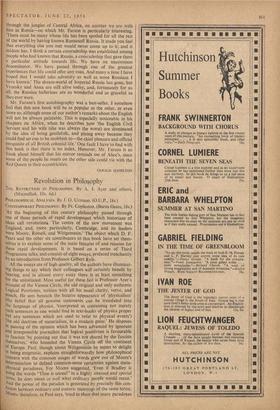Through the Looking Glass
A MIRROR FOR NARCISSUS. By Negley Farson. (Gollancz, 16s.) Mosr of us will remember deriving a certain bitter pleasure some twenty years ago when we read Mr. Farson's autobiography The Way of a Transgressor. We now have a second autobiography, in a sense a continuation of the first. Mr. Farson is one of the best-known journalists of the day, and was for many years London correspondent of the Chicago Daily News, later becoming Presi- dent of the Association of American Correspondents in London, the largest body of its kind in the world. In this capacity he acted as host to various Prime Ministers—Ramsay Macdonald, Stanley Baldwin and Neville Chamberlain. These worthies he quickly dismisses as 'three duds all in a row.' Indeed, our author detests all politicians.
`I do not like them,' he says. 'Seen at close range, they soon dwindled to very ordinary proportions; they lied, they cheated, they talked speciously in public and double-crossed each other and even their own countries in private.' He has a fine contempt. too, for famous politicians of the past. `Gladstone,' he says, 'pot under a microscope, instead of a magnifying glass, would probablY appear as the most blown-up figure of British history. When the Grand Old Man was steaming up and down the countryside orating against Bulgarian atrocities, they were stuffing crippled little children up the flues to clean the chimneys of the stately homes of England.'
I met Negley Farson once or twice in the early Thirties whell he had offices at Bush House. At that time he was busy, amongst other activities, in helping Claud Cockburn with titbits for the latter's news-sheet The Week. I found him a tall, handsome; friendly man with a great sense of humour, and a hatred of pomposity and deceit. His well-known failing, which he takes 0° pains to hide in his book, was his overfondness of the bottle. In his life-long struggle against this enemy, which nearly conquered him, he brought off one great victory when he placed himself in the hands of that historic German professor, Doctor Bumke'
Thanks to the treatment received at his bands, he neither desired
nor took any alcohol for over eighteen months, and might have remained a strict teetotaller had it not been for the idiotic over- doses of M ancL B which he had to take in Central Africa to holu, down an infection in his leg. Professor Bumke is best rememberen in Munich, where he lived, as a famous doctor and as the One selected, in spite of his hatred of the Bolshevists, by the Soviet Government to attend Lenin when he was dying. The life of a successful journalist reads like a constant series 01 trips on a magic carpet. On one page we accompany Mr. Farson through the jungles of Central Africa, on another we, are with him in Russia—on which Mr. Farson is particularly interesting. 'There must be many whose life has been spoiled for all the rest of the world by having known Romanoff Russia. It made you feel that everything else you met would never come up to it; and it seldom has. I think a certain comradeship was established among people who had known that Russia, a comradeship that gave them A particular attitude towards life. We have an uncommon denominator. We have passed through one of the greatest speriences that life could offer any man. And many a time I have hoped that I would take adversity as well as some Russians I have known."1"he dream-world of Imperial Russia has gone, but V ronsky and Anna are still alive today, and, fortunately for us all, the Russian ballerinas are as wonderful and as graceful as they ever were.
Mr. Farson's first autobiography was a best-seller. I somehow feel that this new book will be as popular as the other, or even more so, although some of our author's remarks about the English will not be always palatable. This is especially noticeable in his chapters on Africa, when he describes how 'the English Civil Servant and his wife (she was always the worst) are dominated by the idea of being gentlefolk, and pining away because they could find no one to be snobbish to—the chief pleasure and official Perquisite of all British colonial life.' One fault 1 have to find with this book is that there is no index. However, Mr. Farson is so frank about himself that his mirror reminds inc of Alice's, since some of the people he meets on the other side could vie with the .ed Queen in their eccentricities.
GERALD HAMILTON



































 Previous page
Previous page